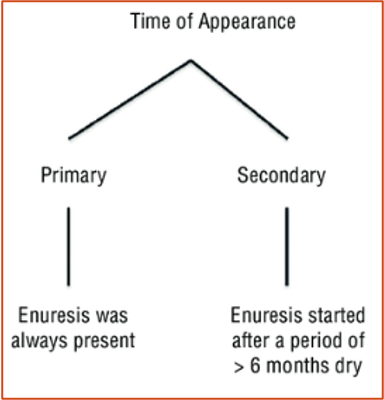Enuresis
Repeated voiding of urine into clothes or bed at least twice a week for at least three consecutive months in a child who is at least 5 years of age.
Types:
- At 2–4 years, the child is developmentally ready to begin toilet training.
- Girls usually attain bladder control before boys.
- Bowel control typically is achieved before bladder control.

Investigations
-
For most children with enuresis, the only laboratory test recommended is a clean catch urinalysis with specific gravity to screen for UTI, renal disease, and diabetes mellitus.
-
Urine culture is based on the urinalysis, to look for UTI.
-
A renal ultrasound and/or voiding cystourethrogram (VCUG) is indicated in children with daytime symptoms, recurrent UTI, or concerns for underlying urologic abnormality.
-
MRI spine for neurologic findings (urinary retention, constipation, tingling sensation in lower limbs, back pain).
Causes of Secondary Enuresis:
- Chronic or recurrent UTI
- Diabetes mellitus or insipidus
- Seizures
- Constipation
- Neurogenic bladder
- Posterior urethral valves, ectopic ureter, vesicoureteral reflux
- Sleep disturbance such as OSA
- Pinworm infection
- Psychosocial stressors (more common in primary enuresis)
- Mass impinging on the urinary system
- Combined nocturnal and diurnal enuresis: usually due to congenital urinary tract anomalies.
- Diurnal incontinence: the most common cause is a pediatric unstable bladder. May occur in girls with a history of sexual abuse.
Management
A) First Line: Behavioral Y
- Parent–child education and behavioral approach
- Charting with rewards for dry nights
- Voiding before bedtime
- Night awakening 2–4 h after bedtime, while at the same time making sure that parents do not punish the child for enuretic episodes
- If behavioral approach fails, enuresis alarms are indicated for a period of 8–12 weeks
oxyputinin for chronic management of enuresis
B) Second Line: Medicine
- Desmopressin acetate (DDAVP) (reserves water in body)
- Side effects:
- Relapse is high after discontinuation
- Hyponatremia and may cause seizure due to water intoxication. The patient must be educated not to consume an excess of fluids on any evening in which desmopressin is administered. A maximum of one cup of fluid should be offered at the evening meal, and no fluid at all within the 2 h preceding bedtime.
-
Treat the cause and refer if needed
-
Treat constipation if present